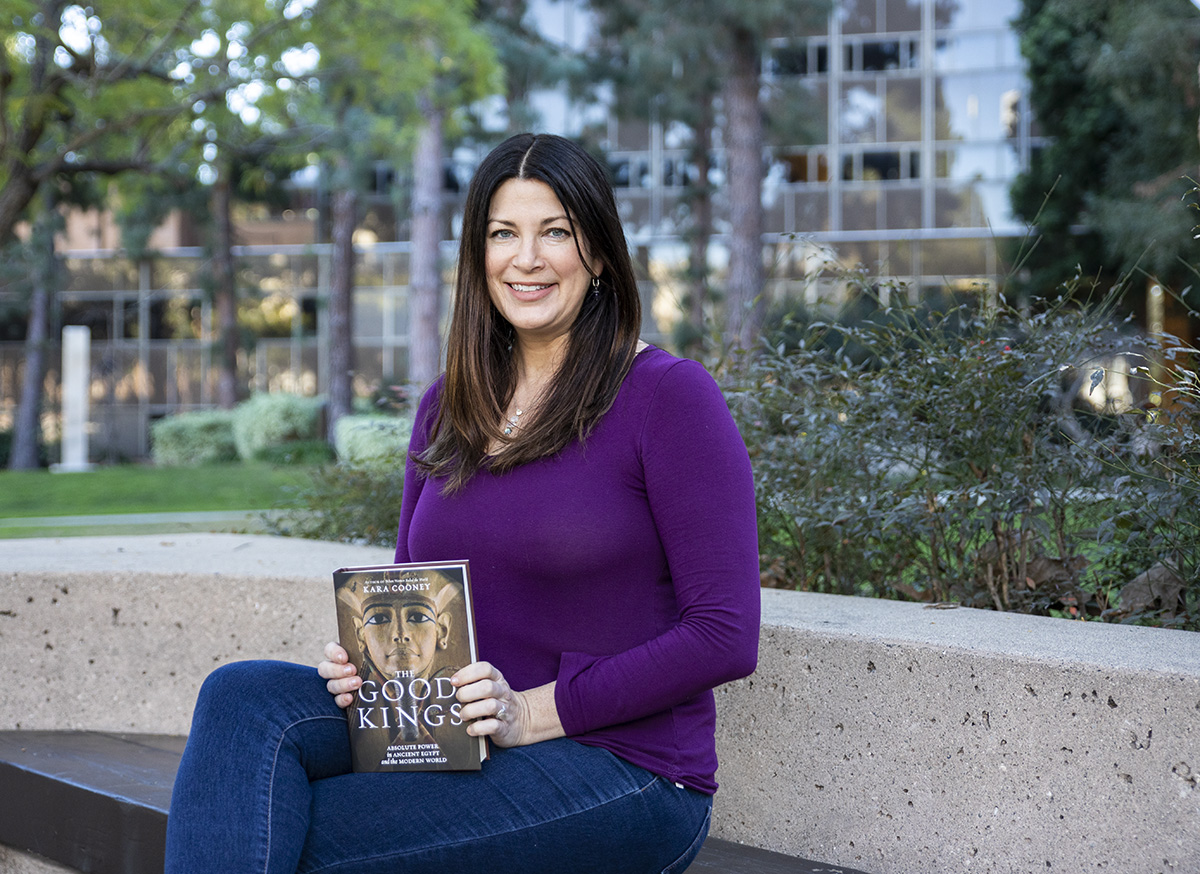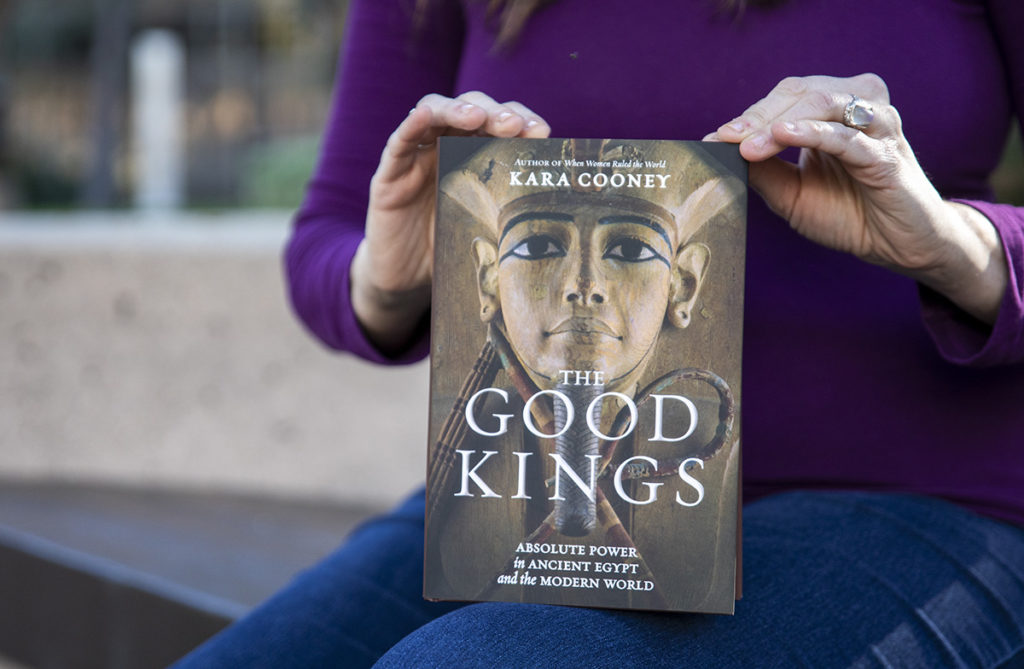UCLA professor draws modern-day comparisons to ancient Egyptian power in new book

Professor of Egyptian art and architecture Kara Cooney has been writing her latest book, “The Good Kings,” over the past two years. With a study of five pharaohs of ancient Egypt, Cooney aims for the book to shed light on modern structures of power and their similarities to those of the past. (Ashley Kenney/Photo editor)
By Devon Whalen
Feb. 7, 2022 5:58 p.m.
This post was updated Feb. 7 at 10:14 p.m.
UCLA professor Kara Cooney examines power in ancient Egypt and connects it to modern times in her recently released book “The Good Kings.”
Released in November, the book is a study of five pharaohs of ancient Egypt: Khufu, Senwosret III, Akhenaten, Ramses II and Taharqa. Cooney, a professor of Egyptian art and architecture, asks readers to reexamine ancient patriarchal systems often glorified by pop culture and academia.
The book examines different uses of authoritarian power through these case studies, Cooney said, in an attempt to understand and define the true nature of authority, rule and submission to power.
“The Good Kings” also presents modern-day comparisons to ancient Egyptian power structures and leaders, Cooney said, adding that the book aims to demonstrate that the patriarchy of ancient Egypt is analogous to the patriarchy of the modern day.
However, Cooney said the book’s development did not begin with writing pages. Transcripts from Cooney’s taped Zoom lectures inspired “The Good Kings,” and Cooney further honed her ideas during discussions with her students in graduate seminars, she said.
“To see the amount of electricity in that class, the amount of fervent discussion, it only spurred me on to be braver in that book than I would have been otherwise, because I felt like I had a whole generation behind me, in a way,” she said. “And so I brought more badassery to it.”
Jordan Galczynski, a graduate student in the department of Near Eastern languages and cultures, served as a teaching assistant for Cooney, who is also her doctoral advisor.
Galczynski echoed Cooney’s account of the collaborative classroom writing process, saying that Cooney opens herself to critique during these discussions, occasionally changing her approach in sections of the book with students’ feedback.
Cooney’s open dialogue with students became part of the foundation of not only “The Good Kings” and Galczynski and Cooney’s podcast “Afterlives,” but of Jonathan Winnerman’s path to UCLA. Winnerman, an academic administrator in ancient studies, met Cooney when he was a graduate student at the University of Chicago. Cooney’s support of student ideas and learning helped draw him to Westwood, he said.
Though he did not play a direct role in the writing process as Cooney’s students, Winnerman said he and Cooney held casual brainstorming sessions throughout the pandemic and discussed readings on authoritarianism. Winnerman added that these discussions demonstrated Cooney’s profound interest in the study of power.

After two years of development, the book had a mixed reception.
The original hard copy of “The Good Kings” incorrectly states that Kyle Rittenhouse, a man acquitted of the murder of two men during an August 2020 protest in Kenosha, Wisconsin, killed two Black men instead of two white men. Following One America News Network’s Kara McKinney’s tweet pointing out the inaccuracy, Cooney received backlash and made a public apology for the error. Cooney also corrected the electronic version of the book.
“The amount of misogyny and hatred spewed against me for this mistake was rather extraordinary,” Cooney said. “A lot of it has calmed down, … but I still get the occasional message of hate and vitriol and misogyny.”
There has been far less discussion of “The Good Kings” among more academically conservative Egyptologists than there was of her previous books, Cooney added. She attributed this silence to both a fear of damaging scholarly relationships with modern Egypt and a desire to keep ancient Egypt on a nonpolitical pedestal.
Cooney has been criticized in the past for drawing close comparisons between the ancient world and the modern one, she said, adding that some scholars argue such comparisons simply cannot be made across such a vast cultural and chronological distance.
In one instance, in a 2015 review of Cooney’s book “Hatshepsut: The Woman Who Would Be King,” Durham University professor Christina Riggs argued the book inappropriately projects modern emotions and values onto ancient figures.
Winnerman, by contrast, said he hopes to see the field move more toward comparative analyses such as in “The Good Kings,” as these analyses can help society better understand modern socio-political dynamics. Similarly, Galczynksi said trade books such as “The Good Kings” help increase public access to academia.
“There’s not so much a debate, but a critique, from outsiders onto academia that we’re in our little ivory tower and that our work is not worthwhile,” Galczynski said. “When academics write these more popular trade books, that’s the point. They’re trying to make the ancient world accessible to everyone.”
Ancient Egypt can be a useful case study to examine imbalanced structures of power that may be applicable to the modern context, Cooney said.
“Because (patriarchy in ancient Egypt is) so different, it’s something we can see very easily,” Cooney said. “We have it too, but you can’t see it. It is invisible to you. It is the water in which you swim.”


